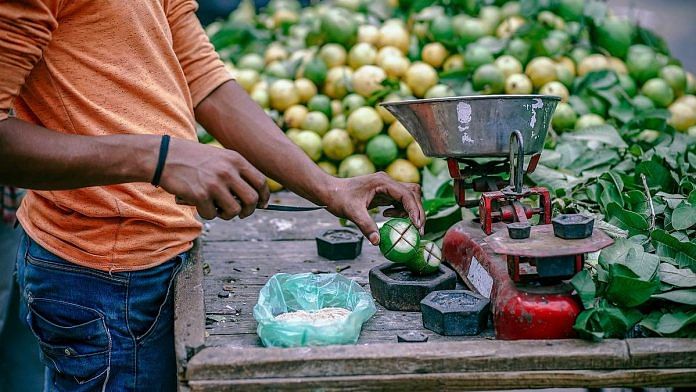New Delhi: Private banks continue to avoid disbursing loans to street vendors, as there has been less than 1 per cent increase in the share of credit extended by them to beneficiaries under the PM Street Vendor’s AtmaNirbhar Nidhi (SVANidhi) scheme in the last two years, according to a response submitted by the Ministry of Housing and Urban Affairs (MoHUA) at the Parliament Monday.
The PM SVANidhi scheme aims to facilitate collateral-free working capital loans of up to Rs 10,000 for one-year to street vendors who want to restart their businesses that were adversely impacted during the Covid-19 lockdown. Last year, its lending period was extended to December 2024, with a target of benefitting 42 lakh street vendors.
This “lopsided participation” by public and private banks in disbursing loans to street vendors was observed earlier too. It was found that only about 1.6 per cent of the total loans were given to street vendors by private banks in 2021.
The share of loans disbursed by private banks increased marginally to 2.21 per cent this year, according to the MoHUA’s statement.
While more than 47.94 lakh loans have been extended in three tranches under PM SVANidhi since its inception in 2020, only about 93,164 loans have been disbursed, as of 5 March, by private sector banks during the period.
The MoHUA also informed the Parliament that along with the Department of Financial Services (DFS), it was regularly conducting joint/independent separate review meetings with lending institutions, including private sector banks, to improve their performance under the scheme.
Also read: DDA okays Delhi master plan 2041, critics say layout ‘generalised’ & far from ‘ground realities’
Other aspects
Some of the other aspects of the PM SVANidhi scheme include enhanced loans of Rs 20,000 and Rs 50,000 in the second and third tranches respectively, on repayment of earlier loans.
Regular payments are incentivised through an interest subsidy of 7 per cent per annum and rewarding digital transactions by way of cashback up to Rs 1,200 per year.
However, it has been pointed out that many vendors often do not have a proper certificate of recommendation or any certificate of vending from local bodies despite multiple applications, and are therefore deemed ineligible for the scheme.
The MoHUA also said that in addition to those who have been identified as “street vendors” in the Urban Local Bodies survey (ULBs), been issued Certificate of Vending (CoVs) and Identity (ID) Cards and who have been vending on or before 24 March 2020, it will ensure that others are also guaranteed benefits under the scheme.
“The vendors from surrounding development/peri-urban/rural areas, vending in urban areas, including those who have been left out of the ULB-led survey, or who started vending after completion of the survey are also issued Letter of Recommendation (LoR) by the ULBs for the purpose of availing benefits under the scheme,” it said.
Also read: How state-owned IGL plans to upgrade Delhi govt’s gaushalas with solar panels, biogas plants



